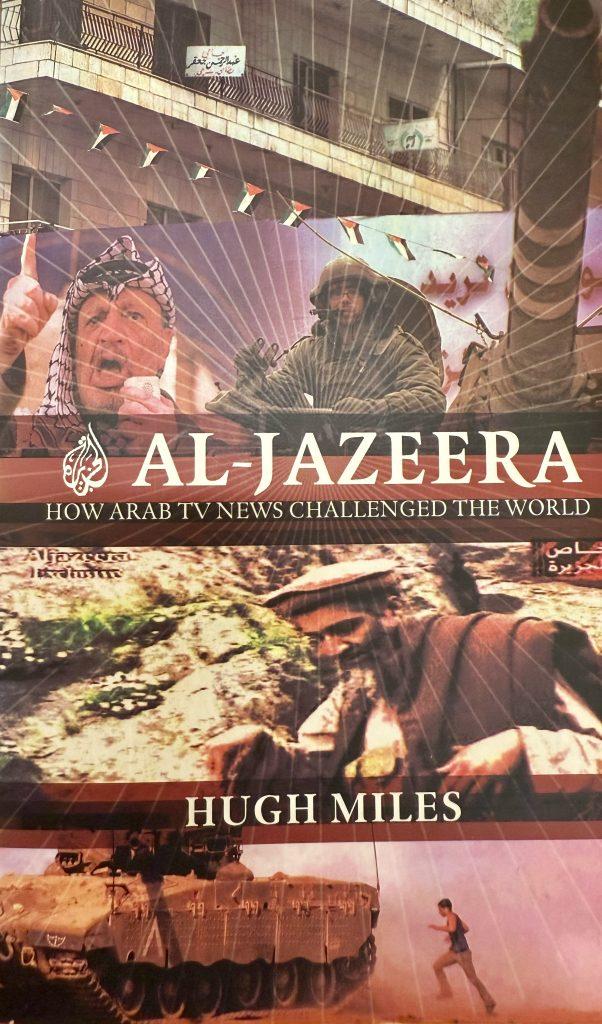Our first glimpse of this emerging trend (Arab brands becoming global) was spotted in 2004 when BRAND CHANNEL the online branding service – established by INTERBRAND – ranked the most influential gobal brands with the inclusion of an Arab brand amongst its Top Five.
Apple claimed the top position, followed by Google, then Ikea, Starbucks and Al Jazeera in the 5th place, replacing Coca Cola.
Al Jazeera’s rise from a small satellite channel based in Doha, Qatar, to one of the most influential global news brands – of that period – is a compelling story of innovation, controversy, and transformation in the international media landscape.
Launched in 1996, Al Jazeera set out to provide an alternative to the state-controlled media that dominated the Arab world. At a time when news coverage in the region was often heavily censored or shaped by political agendas, Al Jazeera offered a rare platform for independent journalism. The decision to use satellite broadcasting was revolutionary, allowing the network to reach a global audience – not just across the Arab world, but also in Europe, Asia, and parts of Africa. By 2000, Al Jazeera had firmly established itself as a major media player.
The establishment of Al Jazeera was signifacantly influenced by a group of former employees from the BBC Arabic Service many of whom were well experienced in journalism and broadcasting which provided a strong foundation for launching a new independent news channel, in the Arab world – at that time.
BBC’S reputation for quality journalism and professionalism, played a crucial role in shaping the editorial standards at Al Jazeera, which included a strong commitment to impartial reporting, investigative journalism and focus on factual accuracy; thus helping this new broadcaster differentiate itself from other media outlets that were often state – controlled and passive towards evolving critical criticism.
On 27 of June 1995, the 44 Years old Qatari crown prince Sheikh Hamad proclaimed himself Ruler of the country after staging a coup against Sheikh Khalifa, his father.
Sheikh Hamad bin Khalifa Al Thani, issued a decree establishing a new TV channel called Al Jazeera, thus sheltering the BBC Arabic team under his wings. To help the new channel start up, he gave Al Jazeera Five Hundred Million Qatari Riyals ($137 Million) as a one-off payment.
While many Western networks struggled to provide nuanced reporting on the Arab world, Al Jazeera became known for its local expertise, commitment to underreported stories, and willingness to tackle topics often considered too sensitive or controversial. For example, following the Gulf War of 1990-91, the channel’s unfiltered live broadcasts of U.S.-led coalition airstrikes on Iraq in 1998, directly from within Iraq, drew both admiration and criticism, offering a stark contrast to the more sanitized coverage provided by Western broadcasters.
In the late 1990s and early 2000s, Al Jazeera gained further attention by offering the first international platform for Osama bin Laden. The exclusive 4 hours interview conducted by the Pakistani journalist Rahimullah Yusufzai with the Al Qaeda leader in the years before the 11th of September, along with the network’s willingness to air his anti-American rhetoric, thrust the channel into the global media spotlight.
While some critics accused Al Jazeera of promoting extremist views, the network maintained that its role was to provide a space for all perspectives, including those of militant groups, in the name of journalistic integrity. This stance became one of Al Jazeera’s defining features, and while it drew criticism from Western governments, it also cemented the network’s reputation as a challenger to mainstream medi narratives.

After the attacks of September 11, 2001, Al Jazeera’s coverage became even more consequential. The network broadcast bin Laden’s messages and al-Qaeda videos, including chilling tapes released in the aftermath of the attacks. Also the interview conducted by Al Jazeera’s Tayseer Allouni in October 21, 2001 when Osama Bin Laden was on the run in the mountains of Afghanistan.
https://youtu.be/F9GnTpqFz88?si=ehSEiu3bmstkOVew
This earned Al Jazeera both global attention and widespread criticism, particularly from the U.S. government, which accused the network of serving as a mouthpiece for terrorists. However, Al Jazeera remained committed to presenting a wide range of viewpoints, which in turn attracted large international audiences seeking alternative sources of information. A key example of the channel’s transformation into a global brand was its decision to modify its calligraphic Arabic logo, adding the name ” Al Jazeera” in English alongside its iconic Arabic script. This change symbolized the network’s growing reach, especially as its news scoops were broadcast across screens all over the world.
Al Jazeera’s willingness to air content that other outlets often shy away from -such as graphic footage from conflict zones, controversial political opinions, and marginalized voices— earned it widespread admiration.
Yet, despite its successes, the network has faced accusations of bias, particularly in relation to its outspoken stance on U.S. foreign policy, Israel, and some Middle Eastern governments. The network defended its editorial independence, sometimes at the cost of tensions with political powers, as seen during the Iraq War when its office in Baghdad was bombed by the U.S. military.
Despite these challenges, Al Jazeera continued to expand globally, leveraging digital platforms and social media to strengthen its influence and maintain a loyal following.
As Al Jazeera’s reputation grew, it invested heavily in building its brand. The network’s modern studio designs, on-air graphics, professional journalism, and 24/7 news cycle set it apart. Its well-trained reporters, many of whom hailed from the regions they covered, added credibility to its coverage. Additionally, Al Jazeera’s high production values, including investigative reporting, documentaries, and talk shows, helped it appeal to a more global and sophisticated audience. Today Al Jazeera runs the following channels:
- Al Jazeera Arabic
- Al Jazeera English
- Al Jazeera Balkans: transmitting regional news for the Balkans area
- Al Jazeera Mubasher: dedicated to live events, press conferences and parliamentary sessions.
- Al Jazeera Documentary: transmitting documentaries and factual program
- AJ+ (digital): an online social video brand in English, Arabic, Spanish and French.
- Al Jazeera Investigative Unit (AJI)
Al Jazeera’s journey from a small regional network to a global media powerhouse demonstrates the power of bold journalism in an increasingly interconnected world. Its pioneering use of satellite technology, successful integration into the digital era, commitment to airing diverse viewpoints, and in-depth reporting on global events have all contributed to its rise as a major force in international news. In a media landscape often characterized by echo chambers and narrow narratives, Al Jazeera’s role as a disruptor and challenger to mainstream media has earned it both admiration and criticism, solidifying its place in the annals of modern media history.
Contributors:

- Abdo Saleh: Executive Design Director – M&c Saatchi – Mena
- Hugh Miles: Al Jazeera – How Arab TV News challenges the world – An Abacus Original – 2005